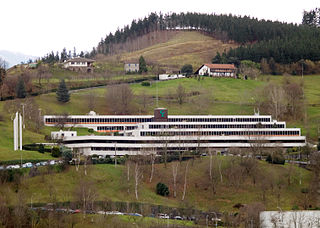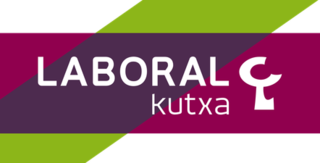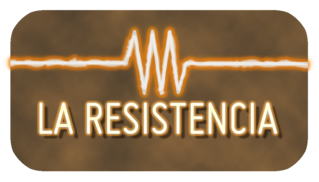
Rail transport in Spain operates on four rail gauges and services are operated by a variety of private and public operators. The total route length in 2012 was 16,026 km.

The Workers' Commissions since the 1970s has become the largest trade union in Spain. It has more than one million members, and is the most successful union in labor elections, competing with the Unión General de Trabajadores (UGT) (historically affiliated with the Spanish Socialist Workers' Party, and with the anarcho-syndicalist Confederación General del Trabajo, which is usually a distant third.

Basque Workers' Solidarity is the most influential trade union in Basque Country, having been created, as Solidaridad de Obreros Vascos, by members of the Basque Nationalist Party on June 10, 1911, in Bilbao.

La 1 is a Spanish free-to-air television channel owned and operated by Televisión Española (TVE), the television division of state-owned public broadcaster Radiotelevisión Española (RTVE). It is the corporation's flagship television channel and is known for broadcasting mainstream and generalist programming, including Telediario news bulletins, prime time drama, cinema and entertainment, and major breaking news, sports and special events.

Euskal Irrati Telebista is the Basque Autonomous Community's public broadcast service, which broadcasts throughout the Basque Country. Its main brand is Euskal Telebista.

Langile Abertzaleen Batzordeak is a Basque left-wing nationalist and separatist trade union operating mainly in the Basque Country under Spanish rule currently led by Garbiñe Aranburu.

In Spain, a savings bank is a financial institution that specializes in accepting savings deposits and granting loans. Spanish banks fall into two categories: Privately owned banks (bancos) and government owned banks. The original aim was to encourage thrift among the very poor, but they evolved to compete with and rival commercial banks.

Caja Laboral Popular Cooperativa de Crédito or Caja Laboral was a Spanish credit union established in 1959 as part of the Mondragon Corporation and headquartered in Mondragón, in the Basque Country of Spain. The major financial provider behind the Basque cooperative movement, Caja Laboral covers the financial segment of Mondragon and provides banking and financial services to its customers through a network of over 370 branch offices in the Basque Country and beyond. With over 1800 employees – who are actually the partners-owners of the bank following the cooperative philosophy of shared ownership and stewardship - Caja Laboral generates annual revenue in excess of €330 million.
Elections of trade union representatives were held across Spain in the first months of 1978. These were the first democratic union elections in 40 years. According to the state news agency EFE, elections were held in 29,918 companies for a total of 124,579 representative posts during the first three months of 1978. The newly elected company committees replaced the former jurados de empresa of the Franco era as the recognized employees' representatives.
Eusko Langileen Alkartasuna (Askatuta) – Solidaridad de Trabajadores Vascos (Independiente) was a trade union centre in the Basque Country, formed in 1976 after a split in ELA-STV . It rejoined ELA-STV in 1990.
Rosa Elena Bonilla Ávila, also known as Rosa Elena de Lobo, a Honduran politician and interior designer, is the wife of the 54th president of Honduras, Porfirio Lobo and former First Lady of Honduras.

Laboral Kutxa is a Basque credit union. It was born in March 2012 as a result of the merging of Caja Laboral Popular Sociedad Cooperativa de Crédito and Ipar Kutxa Rural Sociedad Cooperativa de Crédito. The merging project was announced in March 2012 and completed eight months later, in September 2012, although the new company was not officially presented until April 2013.
Trade unions in Costa Rica advocate for the rights of workers in Costa Rica. Dating back to the late 1800s, labor unions in the country have been a political force. They remain active in political and social life for many Costa Ricans.
Basque National Liberation Movement prisoners are all those people who have been imprisoned, placed on remand, or otherwise kept in custody due to their illegal activity in support of the Basque National Liberation Movement.
The term Basque derbies refers to the various local derbies between the football teams based in the Basque Country, Spain. This can also include the province of Navarre outside of the autonomous community. It specifically refers to individual matches between the teams, but can also be used to describe the general ongoing rivalry between the clubs and fans.
Women in Unión General de Trabajadores (UGT) in Francoist Spain played important roles in the union dating back to the Second Republic period, even as their specific needs like maternity leave, childcare provisions and equal pay were subverted for the improvement of better overall working conditions. Women UGT leaders in the Civil War period included María Lacrampe and Claudina García Perez.

The Resistance is a Spanish TV talk show that is broadcast in #0 of Movistar +. Its first edition was on 1 February 2018, hosted by David Broncano broadcast from the Arlequín Theater in Madrid and is produced by El Terrat.

Genoveva Forest Tarrat was a Spanish far-left activist, writer and political prisoner. Born into an anarchist family in Barcelona, she studied medicine in Madrid. During the 1970s, she supported the Basque separatist group ETA in their resistance to the government of dictator Francisco Franco. From 1974 to 1977, she was imprisoned for alleged complicity in the Cafetería Rolando bombing (1974) which killed 13 people in Madrid. After Spain's transition to democracy, she served a term as a senator from 1992 until 1993. The wife of the Spanish writer Alfonso Sastre, she died in May 2007.
The 2010 General Strike in Spain was a general strike called for Wednesday, 29 September 2010 in Spain by the two main Spanish trade union centrals—Comisiones Obreras and Unión General de Trabajadores—against the labor reform of 2010, promoted by the government of José Luis Rodríguez Zapatero and approved in the Congress of Deputies on 9 September 2010, entering into force on 19 September 2010, and against the reform of the public pension system announced by the Government of Spain.
The Sociedad Cosmopolita de Resistencia y Colocación de Obreros Panaderos was a trade union for bakers in Argentina. It was founded in 1887 by Italian anarchist labor organizer Ettore Mattei.










